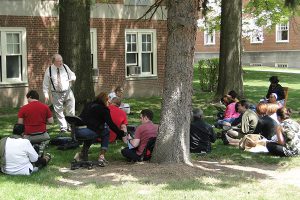The “Inside the PTS Curriculum” series gives you an inside look at what students are learning in their courses at Pittsburgh Theological Seminary. Each article focuses on one class, its subject matter, what students can expect to learn, the required texts, and the kinds of assignments students can expect. We’ll let you know whether the course is required or available for the Master of Divinity (MDiv), the Master of Arts in Pastoral Studies (MAPS), or Master of Theological Studies (MTS). Each article will include the professors’ bio.
This week’s course is: “Prophets, Psalms, and Wisdom Literature.”
About Prophets, Psalms, and Wisdom Literature
This year, Pittsburgh Theological Seminary students learned about prophetic books, the Psalter, and the wisdom literature of the Old Testament with the Rev. Drs. Jerome Creach and Steve Tuell in the class Prophets, Psalms, and Wisdom Literature. This course is required for students in the Master of Divinity (MDiv) degree and Master of Arts in Pastoral Studies (MAPS) degree and is open to students in the Master of Theology (MTS) degree program.
Prophets, Psalms, and Wisdom Literature provides an introduction to the prophetic books (Latter Prophets), Psalter, and wisdom literature of the Old Testament with an exploration of factors that gave rise to and helped shape this material. In addition to examining the background of prophecy in the cultures of the ancient Near East, attention is given to the specific content of these books, to the theology of the prophetic books, to the various literary genres (e.g., oracle, hymn, lament), to methods used in the interpretation of Scripture (source, form, redaction, literary, socio-cultural, canonical, and rhetorical criticism), and to the psalms as a product of Israel’s cultic life. The goal is to seek a deeper understanding of core theological themes within the Judeo-Christian tradition, how these themes relate, and their significance in the Church and world today.
 Students consider the classical prophets in the light of their precursors in Israel and the ancient Near East. This class places Hebrew prophecy in its proper social, historical, and canonical context. The prophets of the Babylonian exile, Jeremiah, Ezekiel, and Second Isaiah, will be considered in particular depth. Special attention is given to the theology of the prophetic books and to the genres of prophetic oracles and the methods that may be employed for their interpretation. An introduction to the Psalms and Wisdom Literature completes the course.
Students consider the classical prophets in the light of their precursors in Israel and the ancient Near East. This class places Hebrew prophecy in its proper social, historical, and canonical context. The prophets of the Babylonian exile, Jeremiah, Ezekiel, and Second Isaiah, will be considered in particular depth. Special attention is given to the theology of the prophetic books and to the genres of prophetic oracles and the methods that may be employed for their interpretation. An introduction to the Psalms and Wisdom Literature completes the course.
Class sessions are devoted to lecture, discussion, and the close study of particular assigned texts. Evaluation is on the basis of the students’ critical grasp of the literature, demonstrated in a midterm and a comprehensive final and the students’ ability to deal creatively with the literature and communicate their insights, demonstrated by a four to five page exegetical essay.
Students use the HarperCollins Study Bible (NRSV), edited by Harold Attridge; The Old Testament: A Historical and Literary Introduction to the Hebrew Scriptures, by Michael D. Coogan; Interpreting the Psalms, by Patrick D. Miller; and Wisdom’s Wonder: Character, Creation, and Crisis in the Bible’s Wisdom Literature, by William P. Brown.
About the Instructors
The Rev. Dr. Jerome Creach is the Robert C. Holland Professor of Old Testament. He earned his doctorate at Union Theological Seminary in Virginia (now Union Presbyterian Seminary). Prior to his study at Union, he earned his M.Div. and Th.M. (in systematic theology) at the Southern Baptist Theological Seminary. Creach is interested in Old Testament theology and the appropriation of the Bible to the life of the Church. An ordained pastor in the PC(USA), Dr. Creach is widely published, and his most recent work is a compact introduction to the Psalms called Discovering Psalms: Content, Interpretation, Reception (Eerdmans, 2020).
The Rev. Dr. Steven Tuell earned his Ph.D. in Hebrew Bible at Union Theological Seminary in Virginia after studying at West Virginia Wesleyan College and Princeton Theological Seminary. Over the course of his academic career, he has received numerous awards for teaching excellence. Tuell’s research interests are biblical prophecy, particularly the book of Ezekiel and the Book of the Twelve, and the biblical literature of the early Persian Period. He has written numerous articles and book reviews, including multiple entries in Feasting on the Word (a commentary on the Common Lectionary published by Westminster John Knox).


good